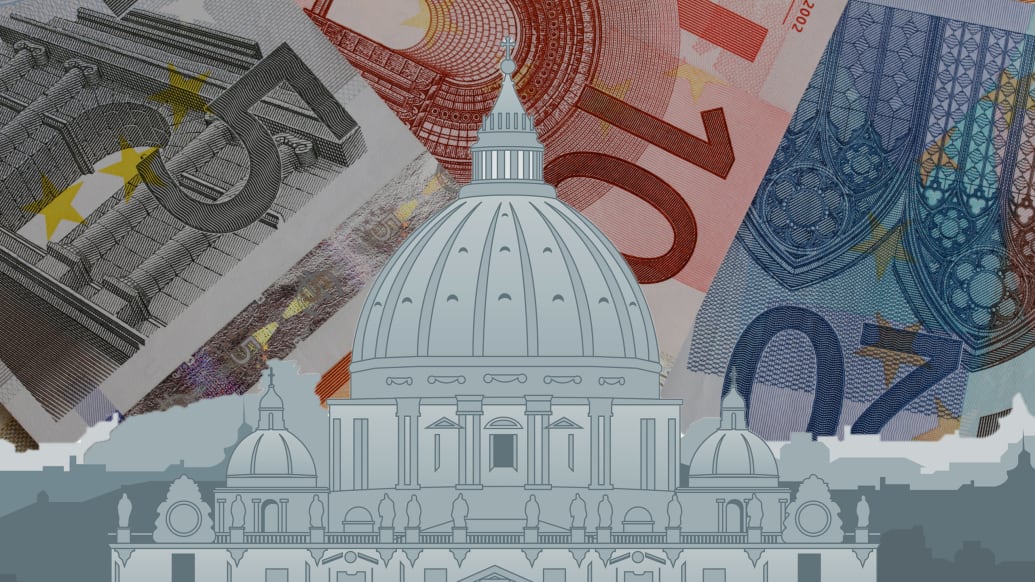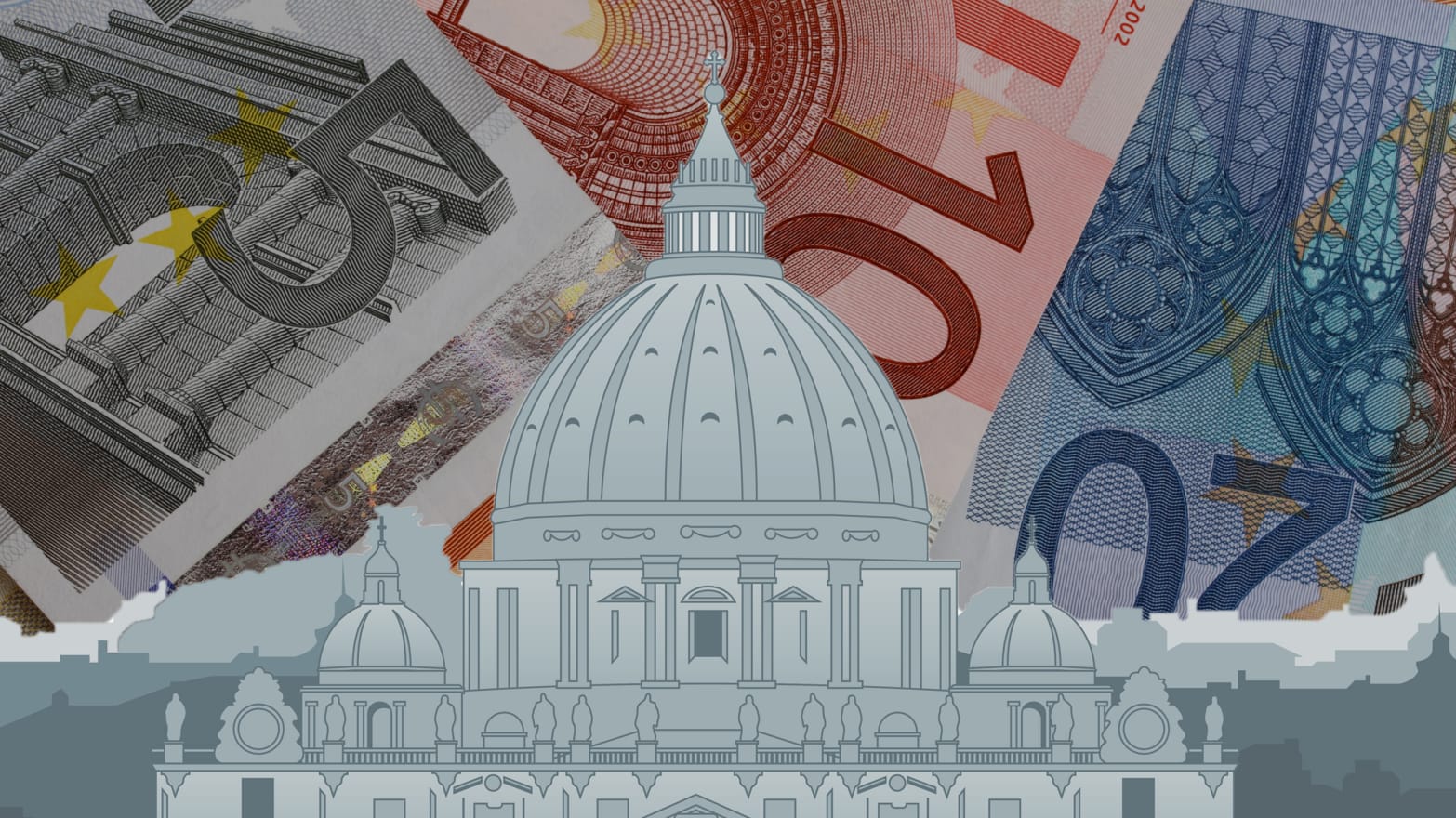VATICAN CITY—The Vatican bank, which says it’s not really a bank despite offering many services normally associated with banking has been given a reprieve from Pope Francis who has decided to reform the financial institution so it can “serve with prudence”, rather than closing it down as many thought he might. Formally known as the Institute for the Works of Religion, or IOR, the non-bank does not have any branches outside Vatican City where its offices take up the better part of a 15th century tower that once housed the papal prisons. Its ATMs are the only in the world that offer instructions in Latin including “Inserito scidulam quaeso ut faciundam cognoscas rationem” which means, roughly, “insert your card to begin” and “deductio ex pecunia” which means “cash withdrawal”.

The IOR has been the subject of great scrutiny and scandal for decades. In 1982, Roberto Calvi, dubbed God’s Banker for his close association with the IOR in his role as head of Banco Ambrosiano, which collapsed, was found hanging under Blackfriar’s Bridge in London under still-suspicious circumstances. Over the years, several international financial institutes, including J.P. Morgan have closed their IOR accounts, refusing to do business with the Holy See’s primary financial arm. In early 2013, before Francis was elected, the Bank of Italy even blocked the use of credit card payments at the Vatican for the IOR’s failure to comply with the European Union’s anti-money laundering regulations, meaning tourists had to scramble for cash to visit the Vatican Museums and buy rosaries and other souvenirs.
Just last summer, a prelate who worked as director of the accounting analysis service of the Administration of the Patrimony of the Apostolic See Nunzio Scarano, nicknamed Monsignor 500 for his preference for large bills, was arrested by Italian police in a twisted plot to smuggle $26.2 million from Switzerland via his Vatican bank account with the help of an ex-spy and financial broker. Shortly after, the IOR’s chief Paolo Cipriani and deputy Massimo Tulli were indicted and will also stand trial on money laundering charges. “The IOR seems to have believed that being an agent for God has exempted it from the rules of man, but the evidence is that it has been as fallible as any other human organization,” Richard Murphy, director of Tax Research UK, said at the time. “The time has come for the IOR to be regulated in the way all other banks are. Nothing less will do, for its sake, for Catholicism’s sake and for the sake of international banking.”
When Francis was elected in March 2013, he made it clear that reforming the Vatican financial mess was a priority. Not only did he want to create a “poor church” to better serve the poor, he also seemed intent on rebuilding the Vatican’s scarred reputation. After the so-called Vatileaks scandal that dogged his predecessor Benedict XVI’s papacy with whispers of financial impropriety by high-ranking Cardinals, Francis gave the impression he might just close the bank’s doors altogether. “St. Peter didn’t have a bank account,” he said shortly after his election. “I don’t know what will become of the bank. Some say it is better that it is a bank, others that it should be a charitable fund, and others say close it.”
Apparently in keeping with the Catholic Church’s tendency towards forgiveness, the pope wants to give it another chance. In February, Francis appointed Australian cardinal George Pell as the head of a new “Council for the Economy” authority tasked with attending to the Holy See’s many financial problems. “If we make better use of the resources entrusted to us we can improve our capacity to support the good works of the Church, particularly our works for the poor and disadvantaged,” Pell said upon his appointment. “We need to be open to expert advice and aware of any opportunity to improve the way we conduct our financial administration.”
The IOR once had more than 30,000 account holders, ranging from private entities to Catholic missionaries around the world. A thorough vetting that began under Pope John Paul II has nearly halved that number. Last year, the IOR closed 900 accounts alone, including those held by diplomatic missions, embassies, and consulates to Syria, Iran, Iraq, and Indonesia after “vague cash transactions” including some for more than half a million euro, according to public documents associated with the IOR’s application to become part of the Moneval “white list” of virtuous financial institutions.
Now the bank aims to keep only accounts that fall under specific categories, including current and former Vatican employees, along with priests who have not taken the vow of poverty, which is not mandatory according to the Vatican webpage on consecrated life. Nuns, who do have to take a vow of poverty, traditionally have not been allowed to open accounts unless they are Vatican employees. After accounts were vetted last year, the IOR reports that it now has only 18,900 accounts, of which 5,200 are held by Catholic institutions accounting for €6 billion ($8.2 billion) of the IOR’s total assets. The remaining 13,700 are held by individuals, including clergy and diplomats, accounting for €1.1 billion ($1.5 billion) of the IOR’s assets. In a letter to those whose accounts were being closed last year, IOR’s president wrote that the closure “must not be confused with the interruption or suspension of relations with clients suspected of violating the anti-money laundering laws in place. This responsibility lies with the Vatican authorities that have been tasked with enforcing the law and supervision.” The letter was sent errantly to dozens of Vatican widows who were miscategorised and who were eventually allowed to keep their accounts open. Anyone who does not come in and clear out their cash in adherence with a strict deadline essentially “donates” their funds to the Vatican.
The pope’s decision to keep the IOR running surprised some who thought he might close the institution as a clear signal of zero tolerance for continued corruption. IOR spokesman Max Hohenberg welcomed the pope’s reprieve. ‘We will complete our plan in order to ensure that the IOR can fulfill its mission as part of the new financial structures of the Holy See and Vatican City,” he said in a statement, calling Francis’s decision to keep the IOR running brave. “It represents a powerful endorsement of our very mission and the hard work accomplished over the past 12 months.”
Cardinal Pell and those with a clear mandate to reform the IOR face serious challenges before the Vatican financial system can be deemed completely clean and clear of corruption. In its most recent evaluation of the Vatican, Moneyval auditors wrote (PDF): “Money laundering has been fully criminalized [by the IOR] in accordance with the [Financial Action Task Force] standards although effectiveness of application has yet to be demonstrated as there have been no investigations, prosecutions or convictions for money laundering. Likewise, financing of terrorism has been criminalized, although the specific criminalization of financing in respect of certain terrorist acts in relevant UN counter-terrorism conventions is absent.”
When the IOR published its annual report (PDF) for the first time last year, they did little to ease the minds of the skeptical. IOR listed among its assets €41 million ($56 million) worth of precious coins and gold, a real-estate company to manage the Church’s impressive real estate and two investment properties worth around €2 million ($2.8 million). The IOR also reported that it earned €86 million ($118 million) in 2012, more than four times more than the year before, claiming the profit came from interest rates and €12 million ($16 million) from commissions for management services—impressive profits for a non-bank.

